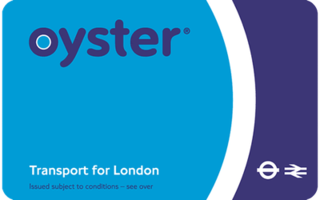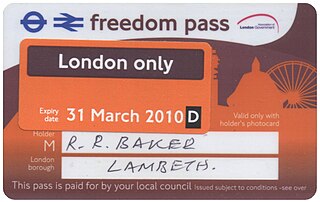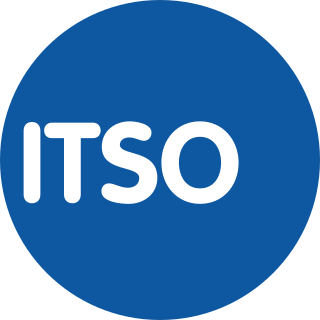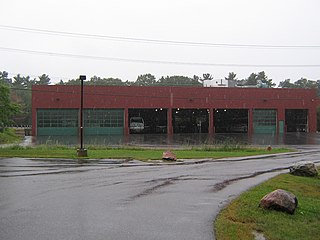
C-Tran, more formally the Clark County Public Transit Benefit Area Authority, is a public transit agency serving Clark County, Washington, United States, including the cities of Battle Ground, Camas, Vancouver, Washougal, and Yacolt. Founded in 1981, C-Tran operates fixed route bus services within Clark County, as well as paratransit services for qualified persons with disabilities (C-Van) and a dial-a-ride service in Camas, Ridgefield, and La Center. C-Tran also provides express commuter services between Clark County and Downtown Portland, Oregon and regional services to the Parkrose/Sumner and Delta Park MAX Light Rail stations, and Oregon Health and Science University. In 2022, the system had a ridership of 4,088,200, or about 15,200 per weekday as of the second quarter of 2023.

The Oyster card is a payment method for public transport in London in England, United Kingdom. A standard Oyster card is a blue credit-card-sized stored-value contactless smart card. It is promoted by Transport for London (TfL) and can be used on travel modes across London including London Buses, London Underground, the Docklands Light Railway (DLR), London Overground, Tramlink, some river boat services, and most National Rail services within the London fare zones. Since its introduction in June 2003, more than 86 million cards have been used.

The Travelcard is an inter-modal travel ticket for unlimited use on the London Underground, London Overground, Elizabeth line, Docklands Light Railway, London Trams, London Buses and National Rail services in the Greater London area. Travelcards can be purchased for a period of time varying from one day to a year, from Transport for London, National Rail and their agents. Depending on where it is purchased, and the length of validity, a Travelcard is either printed on a paper ticket with a magnetic stripe or encoded onto an Oyster card, Transport for London's contactless electronic smart card, or an ITSO smartcard issued by a National Rail train operating company. The cost of a Travelcard is determined by the area it covers and, for this purpose, London is divided into a number of fare zones. The Travelcard season ticket for unlimited travel on London Buses and the London Underground was launched on 22 May 1983 by London Transport. One Day Travelcards and validity on other transport modes were added from 1984 onwards. The introduction of the Travelcard caused an increase in patronage and reduced the number of tickets that needed to be purchased by passengers.

Wheels is a bus service that provides public transportation in the Tri-Valley Region of the San Francisco Bay Area, in the United States. Started in 1986, Wheels offers service to various communities in three cities, and connects to Bay Area Rapid Transit (BART) and Altamont Corridor Express (ACE) trains for connections to and from the greater Bay Area and Central Valley. In 2022, the system had a ridership of 1,019,400, or about 4,100 per weekday as of the second quarter of 2023.

Transport for West Midlands (TfWM) is the public body responsible for co-ordinating transport services in the West Midlands metropolitan county in England. It is an executive body of the West Midlands Combined Authority (WMCA), with bus franchising and highway management powers similar to Transport for London. TfWM's policies and strategy are set by the Transport Delivery Committee of the WMCA.

Freedom Pass is a concessionary travel scheme, which began in 1973, to provide free travel to residents of Greater London, England, for people with a disability or over the progressively increasing women's state pension age. 60 in 2010, then 66 until about 2026. The scheme is funded by local authorities and coordinated by London Councils. Originally the pass was a paper ticket, but since 2004 it has been encoded on to a contactless smartcard compatible with Oyster card readers.

Tyne and Wear PTE, branded as Nexus, is an executive body of the North East Joint Transport Committee and is best known for owning and operating the Tyne and Wear Metro. It replaced the Tyneside PTE on 1 April 1974.

ITSO Ltd is a non-profit membership organisation assisting standardisation of public transport ticketing in the United Kingdom.

Morley railway station serves the town of Morley in West Yorkshire, England.

A disabled parking permit, also known as a disabled badge, disabled placard, handicapped permit, handicapped placard, handicapped tag, and "Blue Badge" in the European Union, is a permit that is displayed upon parking a vehicle. It gives the operator of a vehicle permission to special privileges regarding the parking of that vehicle. These privileges include parking in a space reserved for persons with disabilities, or, in some situations, permission to park in a time-limited space for a longer time, or to park at a meter without payment.
There is no single 'discount railcard' available on the UK railway network. In addition to the large number and variety of short-term or localised promotional fares that have been available to passengers on the British railway network in recent decades, there are many permanent concessionary fare schemes available to passengers. Some of these take the form of Railcards, which can be purchased by people who qualify according to the conditions, and which give discounts for all journeys over a period; other concessions are available for individual journeys. In all cases, details of the type of concession will be printed on the passenger's travel ticket, to distinguish reduced-rate tickets from those sold at the standard full fare.
A free travel pass is the privilege of a certain class of passengers to use a public transport service without paying a fare or presenting a ticket. They may need to present an identification card produced by their employer or other sponsoring organization, or by the transit provider.
The Disabled Persons Railcard is a concessionary fare scheme in the United Kingdom giving eligible passengers with disabilities benefits on the National Rail network including a 1/3 discount on fares.
Buses are the most common form of public transport in the United Kingdom. In Great Britain outside Greater London, bus transportation is provided by the market rather than a public service, and are privately owned and operated, except in Northern Ireland, where it is publicly provided and delivered. Councils have a duty to step in and support bus services where they are deemed socially necessary.

A transit pass or travel card, often referred to as a bus pass or train pass etc., is a ticket that allows a passenger of the service to take either a certain number of pre-purchased trips or unlimited trips within a fixed period of time.

The Concessionary Bus Travel Act 2007 is an Act of the Parliament of the United Kingdom which entitles all people resident in England who are either disabled or over the age of 60 to free travel on local buses at off-peak times anywhere within England ; previously, free travel had only been available within the recipient's local authority area.
The Scottish National Entitlement Card (NEC) is a Scotland-wide smart card scheme run by Scottish Local Authorities on behalf of the Scottish Government. It is predominantly operated as a concessionary travel pass, but can also act as Proof of Age for young people (Young Scot NEC) and give access to civic services such as libraries and leisure centres depending on the local authority.
A reduced fare program refers to special programs providing particular passengers with a discounted fare option for travel on a public transport system. In the United States, public transportation systems that receive federal funding are required to offer, at minimum, half fares to the elderly and handicapped persons during off peak travel. Some transportation systems also extend reduced fare options to youth, students, military personnel, and low-income passengers.

Green Mountain Transit (GMT) is the regional public transit system based in Burlington, Vermont, which was formed in 2016 through the merger of two more localized transit systems: the Chittenden County Transportation Authority and the Green Mountain Transit Authority. In 2022, the system had a ridership of 1,774,100, or about 7,300 per weekday as of the second quarter of 2023.
Public transport in South Yorkshire mainly consists of three modes: bus, tram and train.













